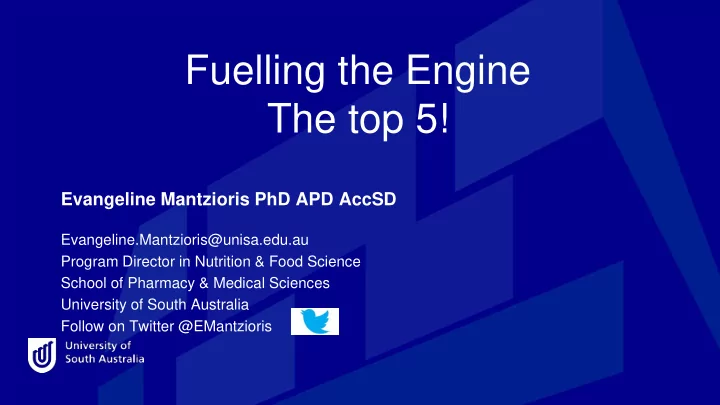

Fuelling the Engine The top 5! Evangeline Mantzioris PhD APD AccSD Evangeline.Mantzioris@unisa.edu.au Program Director in Nutrition & Food Science School of Pharmacy & Medical Sciences University of South Australia Follow on Twitter @EMantzioris
Fuelling the Engine • Energy • Energy is kilojoules/calories • Kilojoules come from CHO, fat, protein, EtOH • At the molecular level energy is ATP Overstims.com
Pathways of ATP synthesis All 3 systems interact, they are used differently by the body according to the exercise or activity requirements – They do not work at the exclusion of the other systems (i.e. Not a light switch) – They work together in different capacities (i.e. Dimmer switch)
Text-book Representation of the Energy Systems
Carbohydrates • Helps prevent muscle and liver glycogen depletion • Delay fatigue • Increase recovery between training sessions (failure to recover is often blamed on over-training) • Allows full benefits of training • Skill development Source: summitdifferent.co.uk
CHO Requirements Before Exercise • Low intensity or skill based activities 3-5g/kg of bw/day • Less elite athletes (club level sports, weekend warrior;~1hr/day) 5-7g/kg of bw/day • Most elite athletes (AFL mid-field player, national leagues; 1-3hr/day) 6-10g/kg of bw/day • Highly elite (Tour de France, Olympic class?, >4-5hr/day) 8-12g/kg of bw/day www.built.lean.com
CHO Requirements During Exercise • are dependent on time • 60mins of exercise need 30g/hr • 2hrs of exercise need 60g/hr • 3hrs of exercise need 90g/hr Source: E Mantzioris
CHO Requirements After Exercise • If less than 8 hr recovery between two fuel demanding sessions • 1-1.2 g/kg BM with high GI CHO every hour for first 4 hr then resume daily fuel needs Source: fiveaa.com.au)
Carbohydrate • Use multi-transportable forms (glucose, fructose**, maltodextrin) • Fluids as 6-8% CHO, maximise absorption and reduce gastro-intestinal distress Source: independent.ie
Carbohydrate • Unable to meet daily requirements • have 50g of CHO the night before (fructose) • 1-4g/kg of body weight in the 1-4hrs before exercise • CHO load over 3 days before about 5-8g/kg of body weight Source: schwartz.co.uk
• Rinsing and spitting with a sports drink can enhance exercise performance • FACT Source: justjared.com
Protein • Building blocks of the body, enzymes, hormones etc • Function at best when energy intake is optimal • Most people/athletes have adequate protein intakes Source: conversation.com.au
Timing • Within 1-2 hrs after resistance training (and up to 24hrs) • 0.3g/kg of body weight • 20-30g of protein – preferably animal-based Source: videoblocks.com
Hydration • Dehydration – impact on performance at 2% • Start well hydrated (check urine) • 5-7ml/kg BM at least 4hrs before performance • Weigh before and after • Replenish in 1-4 hours after competition 150% • Drink volumes of at least ½ cup Source: katherinetimes.com.au
Electrolytes sodium, chloride, - magnesium, calcium, potassium - Difficult to determine who loses electrolytes Maintain hydration – sports - drinks are fine Source: E Mantzioris
Caffeine • Decreases perception of exertion • 1-3mg/kg of body weight – work with lowest possible dose – always trial in training due to caffeine and non- caffeine metabolisers Source: bbc.com
Creatine Monohydrate • Rapid loading: 20-25g/d split doses for 5 d • Slow Loading: 3g/d over 28 d • Elevated levels maintained with 2-3g/d • Variability in responses btw individuals • Co-ingestion with CHO (75-100g) improves creatine accumulation • 4-5 weeks to return to normal levels of creatine once ceased • Accompanied with a 1kg weight gain, mostly water Source: www.sportaus.gov.au/ais/nutrition
Other Supplements • Is it safe? • Is it permitted? • Is there evidence it works?
Healthy Eating • Diet first and then supplements • Australian Guide to Healthy Eating This Photo by Unknown Author is licensed under CC BY-SA
“ Let your food be your medicine, “ Eat food, not too much, mostly and your only medicine be your plants ” Michael Pollan, 2008 food” Hippocrates, 460-377BC
Recommend
More recommend